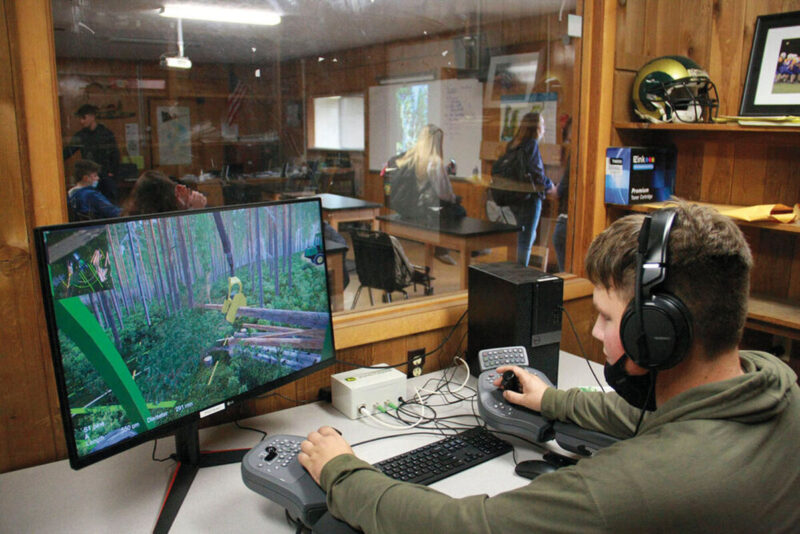Benny Westcott
On a Wednesday afternoon, Sweet Home High School senior Bailey Womack, a teaching assistant in Blake Manley’s wildlife course, uses two joysticks and a computer in the instructor’s forestry and natural resources room. She cuts down one of many pixelated trees on a screen, delimbs it, slices the wood into smaller chunks and places it into a pile.
This isn’t Womack’s first go-round in tech-ey logging. Earlier in the semester she was one of 20 people who competed to cut the most hardwoods and dead spruce in a half-hour timeframe, all while causing the least amount of damage to a virtual forest. She placed second. The winner? Mr. Manley himself.
Womack, who’s been taking Manley’s classes since her freshman year, said that using the logging simulator, a new addition this semester to the forestry and natural resources room, is “a good experience for kids so they can see if they would like to go into a career in logging or working heavy equipment. This isn’t something you can get at the average high school.”
Indeed, Sweet Home’s the only one in the state with this fancy tool, according to Manley. It actually belongs to Oregon State University, which has 10 such simulators for its College of Forestry.
Manley began talking about using them at schools at a summer workshop sponsored by OSU in partnership with the Oregon Natural Resources Educators Association and Oregon Future Natural Resource Leaders. There, he connected with OSU’s Kevin Lyons, a Wes Lematta professor of forest engineering and director of its Mechanized Harvesting Laboratory. Eventually, the university and Sweet Home partnered in piloting a program to roll out the $15,000 simulators in Oregon high schools.
“The great part for us is that the machines they are simulating are exactly the same machines that Melcher Logging runs,” Manley said. “It’s the actual machine the students could be running six months from now when they graduate.”
Chris Melcher, who works for his family’s logging company and used the simulators in OSU’s forestry department, said the gadgets were “good tools for teaching and visualizing.” Different terrains can be downloaded into the interface, or a user may create his or her own topography.
“We are using it as much as we possibly can, every single minute I can trust the kid to be by themselves,” Manley said. He let seniors use it first, since they’d likely be entering the industry sooner.
“The ones that have used it all enjoy it,” he added. “They walk in the door and ask if they can be on the simulator. It’s almost like a game. We don’t want them playing games, but I don’t have the ability to train them on a piece of machinery like this otherwise.”
For three summers, since she was 15, Womack has used heavy equipment on a farm. The simulator, she said, provided “really valuable information.”
“It’s an amazing experience to drive heavy equipment on the road,” she said. “It was a big confidence boost. I learned that I could accomplish a lot of things when I put my mind to it.”
As she virtual-logged on the simulator, she said, “Even if you weren’t looking for a job like this, if you ever needed a job, no matter what it was, you could say ‘I practiced logging.'”
Manley, she continued, is “all for teenagers getting jobs no matter what it is. He’s always saying ‘If you really like this class, you could do this job.’ He emphasizes that you don’t have to go to college to get a career or make good money.”
Womack does plan on pursuing higher education herself, however. She wants to attend the Oregon Institute of Technology to become an MRI technologist.
Senior Jacob Kennedy followed Womack on the simulator, pulling on a pair of headphones to hear birds chirping and trees being felled. He used a harvester to process the trees and a forwarder to place the lengths on a truck.
“You can’t just test these out in real life,” he said of the harvester. “It’s a quarter of a million-dollar piece of equipment, so it’s nice to get the feel of operating it virtually.”
Kennedy has taken one of Manley’s classes every semester of his high-school career. The teacher even helped him land a job at Horner Enterprises Inc., where he drove a tractor spreader and greased the company’s trucks.
“I wouldn’t have gotten that job if Manley hadn’t recommended me,” he said. “If you ask him, he’ll help you out.”
Kennedy said that after graduation, he wants to either secure a commercial driver’s license or attend the University of Montana for a degree in forestry and a minor in heavy equipment operation.
Sweet Home High School students using the simulator can practice for the Oregon Logging Conference (OLC), scheduled for Feb. 24-26, 2022, at the Lane County Convention Center and Fairgrounds in Eugene. It will feature a demo competition where students can compete on the simulators against industry professionals.





